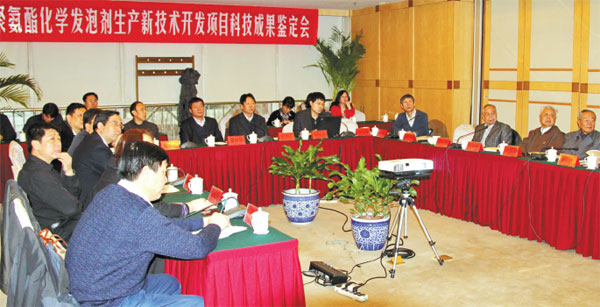New organic compound invented to aid sustainability
|
Experts praise the new environmentally friendly chemical blowing agent at a technology evaluation meeting. Photo Provided to China Daily |
After 10 years of hard work, Chinese scientists invented a new type of environmentally friendly chemical blowing agent, which is expected to replace the prevailing physical blowing agents that contains ozone-depleting substances and super greenhouse gases.
The chemical blowing agent of polyurethane rigid foam, called CFA-A8, was jointly researched and developed by Shandong-based Zibo Zhenghua Foam Materials Co Ltd and Shandong University of Technology.
Polyurethane is an emerging organic polymer material, which is often used for thermal insulation and as waterproof materials in a wide range of sectors such as buildings, vehicles, refrigerators, color steel panels, sandwich panels and pipes.
Various physical foaming agents have been used as the main foaming technology for polyurethane rigid foam, in which hydrofluo rocarbons (HFCs), potent global warming and ozone depleting substances, are the main ingredients.
Statistics showed that the global warming increased and ozone layer thinned dramatically in recent years because of the use of HFCs, which exacerbate the enhanced greenhouse effect when they are released into the atmosphere.
"Scientists around the world had been trying to find a way to eliminate HFCs from the polyurethane blowing agents, but in vain," said Bi Yusui, professor of the chemical engineering department at Shandong University of Technology and a main member of the CFA-A8 research team. "After millions of experiments, we finally found the way to make a new organic compound that is CFA-A8."
At a technology evaluation meeting in Beijing in February last year, the new green organic compound was recognized as an international advanced product by academicians from the Chinese Academy of Sciences and Chinese Academy of Engineering. Shu Xingtian, an academic at the Sinopec Research Institute of Petroleum Processing and a member of the evaluation committee, said that the sugar-based chemical produced no ozone-depleting substances and only had one thousandth of the global warming potential (GWP=1) of the physical blowing agent.
He said the CFA-A8 is the first chemical blowing agent for polyurethane rigid foam in the world. "With lower costs and no waste and pollutant emissions, the new chemical is expected to accelerate the phase-out of the current physical foaming agents contain substances such as HFC-245fa and HFC-365mfc and the other kinds of HFCs."
Experts from the International Cooperation Center of the Ministry of Environmental Protection praised the technology after visiting Zibo Zhenghua Foam Materials laboratories and testing the products' performance indicators last December.
The project received 1.8 million yuan ($293,940) in support from the Multilateral Fund, according to Hou Yongzheng, president of the company. The fund, which was established by the United Nations Environment Program in 1991, is allocated to work that helps reverse the deterioration of the Earth's ozone layer.
The road to success, however, has been far from smooth, said Hou. He added that a number of engineers and experts in chemical technology from both the company and Shandong University of Technology had worked on the project day and night since 2004.
A total of 10 million yuan was spent on research and promotion of the technological transformation. A research center was established, with 35 percent of the firm's staff working for the center.
"Technological innovation is the key to our company's sustainable growth," said Hou. The firm now can produce 6,000 tons of the new chemical blowing agents annually and it is increasing production to meet demand.
International treaty the Montreal Protocol was agreed by all the world's nations in 1987 to protect the ozone layer by phasing out production of numerous substances responsible for ozone depletion.
Another international treaty the Kyoto Protocol was enter into force in 2005 to fight global warming by phasing out production of substances with high global warming potential. According to the European and the US' latest regulations, the blowing agents whose GWP are higher than 150 will be phased out. According to the treaty, China, as the world's largest HFCs manufacturer and user, should cut back on HFCs production by 35 percent by 2020 and eliminate them by 2030.
"It means there will be a huge demand for replacement chemicals that are less damaging to the ozone and have lower global warming potential, so we are quite confident in our business prospects," Hou said.
wangqian2@chinadaily.com.cn



















